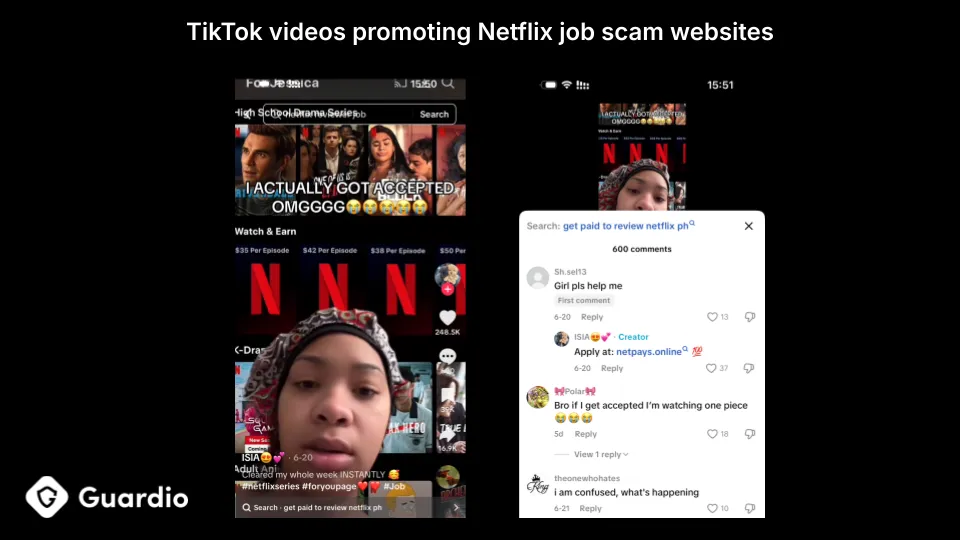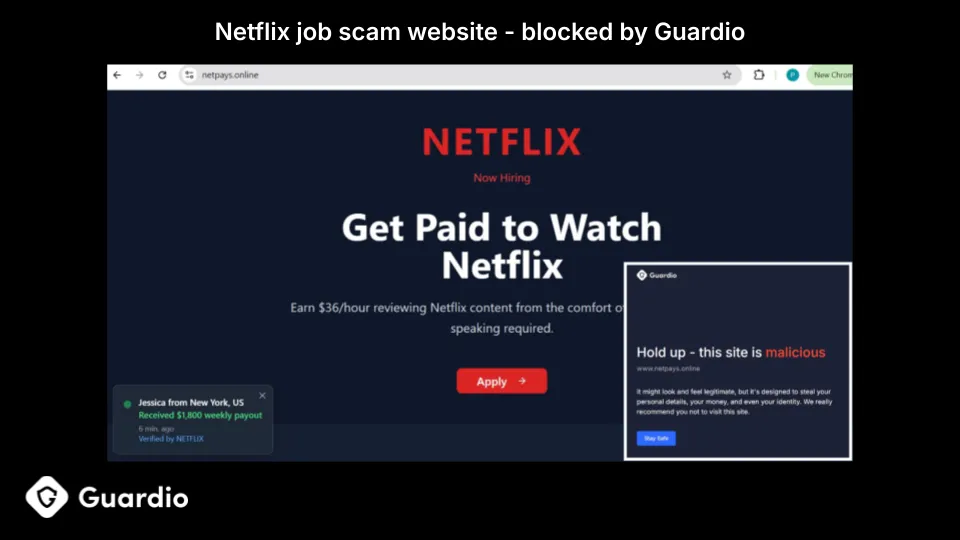How to Spot Fake Job Scams: Red Flags & Safety Tips

Key Takeaways
- Scammers are getting sneakier: Fake job ads now show up on trusted sites and even through Google ads, TikTok videos, or text messages, making them harder to spot.
- Red flags are easy to miss: Watch out for jobs that promise quick money, ask for upfront fees, or suggest skipping interviews altogether.
- AI is helping scammers sound legit: Some fake offers look and sound professional, but they’re designed to steal your info or money.
- Mobile scams are on the rise: If you get job offers through text or WhatsApp, especially ones involving crypto, it’s probably a scam.
- Cyber tools can help: Using protection tools like Guardio can block fake listings and sketchy messages before they do any harm.
If finding a job wasn’t challenging enough, remote work opportunities and AI advancements have added a new twist. These innovations make job searching easier to some extent, but also create perfect conditions for scammers to take advantage of. Nowadays, fake job ads and listings are coming from all directions, with scammers even using Google ads, TikTok videos, and sending deceptive job opportunity texts. The FTC reported losses from job scams jumping nearly 80%, equalling nearly $500 million a year stolen from people who are just trying to find work.
In this article, we’ll dissect the latest trends in fake job scams and show you the red flags to watch out for. Plus, we’ll equip you with ways cybersecurity software like Guardio can be your trusty job search sidekick. Get ready to outsmart scammers and land your dream job safely.
{{component-cta-custom}}
Dodging Fake Job Scams in the Online Job Hunt
Finding a job is no walk in the park. Gone are the days when you'd stroll into an office with a resume in hand. Now, it's all about online applications and remote work opportunities. But here's the kicker: not all those enticing job listings are the real deal. Shocking, right?
In today’s tough economy, scammers are preying on job seekers' vulnerabilities. With money tight due to high inflation and soaring costs, it's easy to get lured into their traps. Scammers are pros at sounding genuine, often impersonating reputable companies and promising quick cash. When you’ve been applying to hundreds of job ads with no luck, you might let your guard down, and those get-rich-quick schemes can start looking pretty tempting.

What Are Fake Job Scams?
Simply put, fake job scams involve phony job offers designed to steal your personal info or money through bogus application fees, background checks, training fees, and more. Whether it's fake job postings, work-from-home scams, or get-rich-quick offers, these shakedowns are all about tricking you into parting with your hard-earned cash or sensitive information.
{{component-did-you-know-custom}}
How Job Search Scams Reel You in and Rob You Blind
We've talked about job-posting scams and LinkedIn job scams before, but what makes these new tactics so surreal is that scammers are now using paid Google ads to push fake job websites. How do they do this? Scammers copy real job postings from legitimate sites like LinkedIn, Craigslist, and Facebook. Then, they craft fake listings that look just as genuine and promote them using Google ads. With AI in the mix, they can make any ad seem so convincing that you wouldn't be able to tell it's a scam.
By the time Google catches on and shuts them down, they've already hooked hundreds, if not thousands, of potential victims. That's why having a good cybersecurity tool is a game-changer. Guardio's team is on top of these scams, blocking fake sites before they can do any damage. So, if you had clicked on one of those "amazing" job opportunities, Guardio would have stepped in and kept your personal info safe.
But wait, there's more—these scams are also hitting up your mobile with fake too-good-to-be-true job offers. Messages like "Hi, my name is Tracy, and I'm a job recruiter for [made-up company]. I wanted to offer you a remote job opportunity. Want to hear more? Click the link, and we'll get back to you." Clicking the link could lead to a few scenarios, none of which are great. One thing that could happen when you click the link is that you get taken to a fake website posing as a legitimate job site. You enter your details—SIN, address, name—and for a background check... whoops, it's all stolen.
The second route this scam can take is even wilder. They switch you over to WhatsApp, a favorite platform for scammers because of its end-to-end encryption. From there, it typically turns into a classic cryptocurrency scam. You're set up with a "job" that involves doing tasks like rating albums and earning a bit of cryptocurrency.
But then, you hit a point where you have to pay to keep going. This process, known as "pig butchering," uses social engineering techniques to fatten you up before stealing your money. This is where Guardio's mobile app comes in. If you have the app on your phone, you're totally protected. The app filters out all these scam messages, so cybercriminals can try as hard as they want, but you're 100% protected with Guardio.
How to Spot a Fake Job Offer
We know how tough the job market is, and with the added stress of scams, we want to make sure you're fully equipped to spot the fakes and score your next career move safely. Here are some red flags to watch out for:
- Too good to be true: If the job offer sounds too perfect or offers an unrealistically high salary for little work, it's probably a scam.
- No interview: Legitimate employers will usually want to meet or talk to you either in person, online or on the phone before hiring. If they skip this step, be cautious.
- Upfront fees: If you’re asked to pay for training, background checks, or other fees, it’s likely a scam.
- Vague job descriptions: Scammers often use vague or generic job descriptions to lure in as many applicants as possible.
- Unprofessional communication: Look out for poor grammar, typos, or generic email addresses (e.g., Gmail, Yahoo).
- Pressure to act fast: Scammers often create a sense of urgency to get you to act without thinking.
- Requests for personal information: Be extra cautious if asked to provide sensitive information early in the process.
- Check company legitimacy: Research the company. If you can’t find much information or if the details don’t add up, it’s a red flag.
{{component-tips}}
Rising Fake Job Scams on TikTok
Why TikTok Attracts Scammers
TikTok's viral, fast-paced content has made it a prime platform for fake “dream job” offers. Scammers target young users with promises of easy money, like getting paid to watch Netflix or test products, knowing these offers appeal to those eager for quick cash or new grads under pressure. Here’s why TikTok attracts scammers:
- Viral content potential: Short, flashy videos can go viral quickly, allowing scam posts to reach massive audiences.
- Dream job appeal: Offers like being a Netflix watcher or Shein tester sound fun, effortless, and lucrative, making them ideal bait.
- Younger user base: Many TikTok users are in the age group most vulnerable to job-related anxiety and inexperience.

Common Red Flags in TikTok Scam Job Posts
Scam job posts on TikTok often appear polished and enticing, but a closer look reveals clear warning signs. Recognizing these red flags is key to avoiding fraud and protecting your personal and financial information.
- No official application process (just a link in a bio or DM).
- Requests for upfront payments for “training” or “equipment.”
- Vague job descriptions with no real qualifications.
- Unrealistic offers (e.g., $900/week to watch Netflix).
- Unprofessional communication or bad grammar.
- Clone websites mimicking real brands.
Psychological Tricks Used by Scammers
Scammers use clever psychological tactics to manipulate emotions and create urgency, making their fake job offers feel irresistible. By playing on the fear of missing out, glamorizing easy lifestyles, and preying on financial stress, they push users to act without thinking critically. Watch out for these tactics:
- FOMO (Fear of Missing Out): Phrases like “limited spots” push users to act fast.
- Glamorized lifestyle: Promises of remote work, passive income, and freedom.
- Targeted emotion: Taps into post-graduation pressure and financial urgency.
AI’s Role in Making Scams Look Legit
Advancements in AI have made it easier for scammers to create convincing fake job scams that mimic real companies and recruiters. From professional-looking websites to AI-generated emails and chatbot interactions, these tools help fraudsters appear credible and deceive unsuspecting job seekers. Here’s how scammers are leveraging AI to look legit:
- Fake websites with professional branding and language.
- Auto-generated content that mimics real recruiter emails.
- Chatbot interactions that simulate HR professionals.
- Offer letters and threads generated with realistic formatting and tone.
Protecting Yourself from Fake Job Scams
Navigating the job market can be tricky, especially with scammers lurking around. So, how do you know if someone is scamming you for a job? Approach job listings with caution: always research the company, avoid offers that sound too good to be true, never pay upfront fees for job opportunities, and verify recruiters on LinkedIn. It's essential to protect yourself by checking the legitimacy of job postings and being skeptical of unsolicited job offers.
This is where Guardio's cybersecurity tools come in. Guardio can help you spot scams, block fake job websites, and filter out scammy texts, allowing you to focus on real job opportunities. With Guardio, you won't waste time on fake listings or risk identity theft and financial loss. Guardio ensures that your job search is safe and secure, so you can concentrate on finding that perfect job.
What to Do If You’ve Been Scammed
If you’ve fallen for a scam job post, taking immediate action can help limit the damage. Quick steps like securing your accounts and reporting the fraud can protect your identity and prevent further loss.
- Act fast: Report lost credit card info to your bank and freeze accounts if needed.
- Change passwords: Especially if reused across accounts.
- Report: Notify the platform, the FTC (reportfraud.ftc.gov), and the impersonated brand (Netflix, etc.).

The Bottom Line
The job market is tough enough without having to dodge fake job scams. With the tips and tools from this article, you can navigate your job search with greater confidence and security. Remember, Guardio is here to help you block those fake job ads and scammy texts, so you can focus on landing your dream job without the worry of falling into a scammer's trap.
{{component-cta-custom}}








